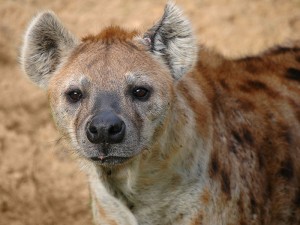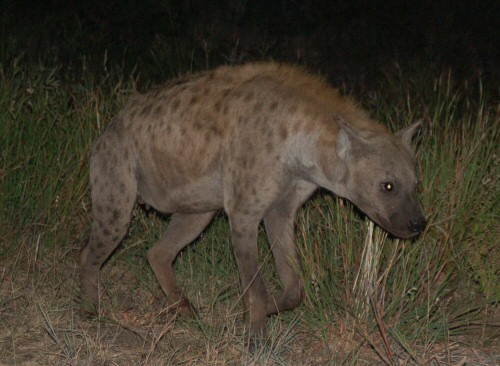American culture (at least the portions I’m most familiar with) has this weird thing about power and hunting. If you’ve ever seen The Lion King, you’ll notice that (despite never actually hunting a prey animal in the movie), the lions are the noble hunting animals, while the hyenas are merely skulking scavengers. And indeed it’s often assumed that hyenas only take the food other have killed, while lions do all the hard work. Nothing could be further from the truth, of course. While all hyenas scavenge, spotted hyenas are some of the most successful hunters in the animal kingdom, both as individuals and groups. And while lions can certainly bring down their own game, they’re not above chasing other predators, like cheetahs or leopards–or, indeed, hyenas–off their kills.

But just like the myth of the lone wolf, this whole hunter/scavenger split doesn’t really reflect nature as it is. The truth is that the majority of predatory animals won’t turn their noses up at a carcass someone else killed if it’s fresh enough for their tastes and abilities. After all, hunting is a dangerous activity that can lead to injury or even death for the hunter, and can be energy-wasting too if a kill isn’t made. It wouldn’t make sense for a meat-eater to turn their noses up at a free and easy meal, and it’s thought likely that humans started off as scavengers before we were more active hunters.
Nature isn’t fussy, and it doesn’t waste a thing. Even when a predator doesn’t eat its entire kill, many other beings will benefit from the leftovers, from insects and other smaller animals to bacteria to fungi and even plants. In fact, entire ecosystems may benefit from the kills of one species; for example, when grizzly bears in North America hunt salmon during spawning season, in a good year they may only eat the most nutritious parts; the remains are left in the forest, sometimes quite some distance from the river, where the younger, smaller bears brought their fish to be eaten without being bothered by their bigger counterparts. The nutrients from the rotting salmon then go into enriching the soil that the forest ecosystem depends on, and in years where the salmon run isn’t as healthy, you can see the effects on the various other beings in the forest because fewer nutrients are being added to the system.
Does this mean that the rats and the trees and the fungi and burying beetles and other living beings that benefit from the bears’ leftovers are lesser beings simply because they scavenge what they didn’t kill? Of course not. Every being in an ecosystem is important, and its absence would be detrimental to the whole. We often glorify bears because they’re charismatic megafauna, big and impressive and so forth, but the burying beetles are just as amazing a bunch of critters, and every bit as necessary, regardless of our biases about them.

But there’s a reason nature doesn’t waste–it can’t afford to. It’s most efficient to recycle and reuse anything possible, and waste is too expensive for such a massive and intricate system. Nature doesn’t draw on resources without returning them, yet somehow we think we can do the same and somehow defy one of the basic realities of life: nothing lasts forever. So we scoff at scavengers, our own and others’, and think that the ideal is to be the best hunter of fresh, new resources possible, whether that’s new clothing at the mall or a new site to frack for oil.
It’s only been in the past century or so that the U.S. has become such a resource-hogging behemoth. It’s been even less time since our culture shifted, in times of crisis, from responding by tightening the belt to responding by pretending nothing’s wrong. People in my grandparents’ generation went through the Great Depression and the rationing of World War II, when the government said “You can sacrifice a bit for your country!” Today, when we face some of the greatest environmental challenges our species has ever encountered, we’re told to keep spending, keep buying oil, and turn a blind eye to the evidence that says anything’s wrong. We’re spoiled; we don’t want to give anything up.
And we don’t want to be scavengers. We don’t want to dirty our hands with the leftovers. Yet any predator that turns up the chance at leftovers is less likely to succeed in the long run. How have we forgotten that in our pride?
I say it’s time we get back to our roots. We got as far as we have as a species through great resourcefulness and adaptability. But we’re throwing away a big part of that, the ability to get the most use out of resources before they’re completely used up. Let’s be creative scavengers and hunters and foragers again. Let’s make “reuse, reduce, recycle” not the niche domain of dedicated environmentalists, but something that belongs to everyone again. Let’s reduce new mining and logging efforts, and see what we can do with the resources we’ve already taken that are just waiting to be made into something new. Let’s make the creativity and resourcefulness of scavenging a point of pride, not just of hides and bones and scraps of meat, but steel and paper pulp and silicon.
Because we are human apes, and we’re in good company with hyenas and lions, vultures and eagles, wolves and foxes and coyotes, all of whom will hunt and scavenge as the opportunities and needs arise. These are all noble, resourceful beings; let’s remember that we are, too.
Will you be a hyena with me?



This is a wonderful post, I love Hyenas, but hadn’t fully considered trying to emulate them more. This has inspired me to test out ways that I can join you in being a Hyena, and less wasteful in my life. Thank you 😀
I’m glad you enjoyed it! Spotted Hyena has been working with me for a few years to be less wasteful and more resourceful, and you’d be welcome to join us!
I would be happy to, not only to learn more from Spotted Hyena, but also the smaller creatures that you mentioned as well. I have been feeling a big push from Dermestid beetles and Crows. And yesterday I glimpsed two different Vultures flying as I rode home from college. Now I am researching what kinds live in Maine, and to learn more about them.
Oh, I love this!! For a while now, I’ve been falling more and more in love with being a scavenger. I will totally hyena with you 😀 😀
Thank you for joining us in hyena-dom!
Amen.
Preach it, preach on!